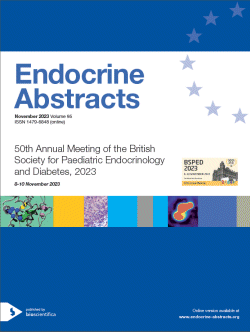
50th Annual Meeting of the British Society for Paediatric Endocrinology and Diabetes
Manchester,
UK
08 Nov 2023 - 10 Nov 2023

Poster Presentations
Miscellaneous/other 1
ea0095p54 | Miscellaneous/other 1 | BSPED2023
Incidence, aetiology and outcome of infants presenting with low sodium and high potassium – population surveillance study in Wales
Pryce Rebekah , Hegde Shivaram , Tuthill David , Cheetham Tim , Tse Yincent
ea0095p55 | Miscellaneous/other 1 | BSPED2023
Phenotyping hypophosphatasia using UK primary care electronic health records
Buendia Orlando , Mahon Hadley , Khan Ghazanfar
ea0095p56 | Miscellaneous/other 1 | BSPED2023
Use of long-acting somatostatin analogue in a paediatric patient with MEN1 – a case report
Olivier Jessica Borg , Wei Christina , Izatt Louise
ea0095p57 | Miscellaneous/other 1 | BSPED2023
Endocrine complications in paediatric patients with transfusion-dependent thalassaemia
Ko Wan Yee , Kaya Banu , Willemsen Ruben
ea0095p58 | Miscellaneous/other 1 | BSPED2023
Endocrine presentation of a renal disorder
ea0095p59 | Miscellaneous/other 1 | BSPED2023
Results from learner’s feedback on the use of free, globally accessible CME-accredited e-learning modules in paediatric endocrinology and diabetes
Idkowiak Jan , Wijngaard-de Vugt4 Conny van , van der Zwan Yvonne , Abu-Libdeh Abdulsalam , Kalaitzoglou Evangelia , Drop Sten , Boot Annemieke M , Ng Sze May



